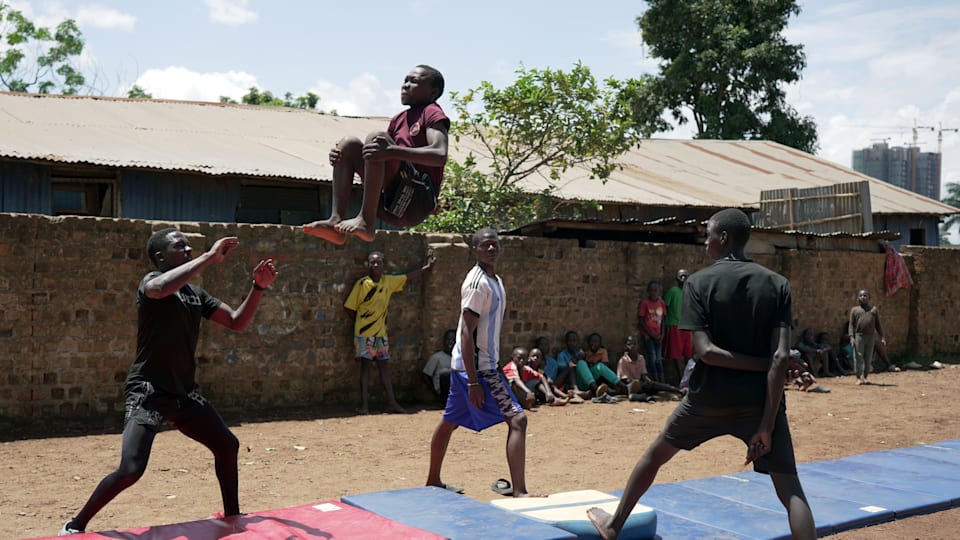More than sport: How street gymnastics is transforming lives in Uganda
Olympics.com visited the Kataka Arts Gymnastics, a local club dedicated to assisting children in one of the largest slums in Kampala, realise and achieve their potential through gymnastics.

“I wish to be like Simone Biles,” Eric Mayanja says dreamily.
The young boy's path to becoming a professional gymnast is daunting, given the obstacles in his path. He has to make do with some old mats that he uses outdoors for his flips because he doesn't have a gym to train in.
What the teenager from Katwe, one of the largest impoverished slums in Uganda, and his American superstar idol share is a deep passion and commitment to the sport.
Mayanja's love of a sport he discovered only three years ago has him spending most of his time in the open spaces of the slum, located on the outskirts of the capital, Kampala, doing backward rolls and jumping in his bare feet.
He's one of the children from the area who are part of the Katara Arts Gymnastics Club. They use gymnastics to show the power of going after your dreams, regardless of their circumstances.
“I love coming here, because doing gymnastics has been my dream since childhood.”
The 17-year-old is one of about 60 youngsters from the streets and surrounding homes in Katwe benefitting from free gymnastics training from the coaches at Kataka.
Flipping at Kataka Gymnastics club in Uganda
Joy and laugher fill the air, as coach Lugolobi Faizo takes the children, aged between 4-17, through their stretching workouts. They happily oblige, but it’s easy to tell they're more interested in getting the next round of practice started. That’s their favourite bit.
Launching themselves into turns and twists, backwards and forwards, which they call somer, the abbreviated form of somersaults.
These acrobatic manoeuvres have been their go-to pastime for the last three years.
“It was during the pandemic that we started the gymnastic classes for the kids, said Faizo, in an interview with Olympics.com. He’s an acrobat and now a self-taught gymnastics coach.
“In our area here, most of the people have been doing acrobatics to earn a living. So, when we started talking about gymnastics, they were surprised and said, ‘we don’t know gymnastics, but we know acrobatics. They didn’t know that gymnastics is the mother of all sports.”
Sylvester Ojiambo of Kataka Arts Gymnastics somersaults with his coach Lugolobi Faizo.
Watching online videos helped the acrobatics expert understand the skills and techniques of gymnastics.
“We started thinking about gymnastics, gymnastics, gymnastics… then we did research on the internet, on YouTube. We needed to see how they train and all…”
Three years later, it’s almost impossible to hear his instructions as the children's squeals of joy fill the dusty compound of a local primary school, which Kataka Arts Gymnastics now use as their training ground.
The kids take turns to do backflips and cartwheels after some rolls and stretches, as Faizo steadies the mat on the red soil ground, while also guiding them through their sequences.
“It’s a lot better now,” he assured of their current location. The dusty and hot environment is still a welcome change from the landfills they previously used, where the aspiring gymnasts would perform barefooted.
“Before we were on a dumpsite when the co-founder, Yiga Mustafa, started it. Then the school allowed us to use part of their playgrounds during the weekends and after school.”
At Kataka Gymnastics there are no obstacles to ambitions
With all its giddiness and vibrant feel, there is a heaviness to Katwe. Many of the children in the club live in extreme poverty, while some are homeless.
“When I was young, I liked somersaulting, but my mother didn’t like it. So, when they started gymnastics, I joined them,” said Mayanja.
“I also love gymnastics,” added his club mate Sylvester Ojiambo,14, who idolizes Olympic champion Nikita Nagornyy.
“I also like the fact that we get sponsors who give us some equipment and I even get clothes in gymnastics.”
“It’s funny that people here don’t know gymnastics yet. For us, we know,” added Mayanja who confesses to spending most of his free time, when he can access a phone, watching Biles’ training routines. Just another generation of youngsters mirroring the seven-time Olympic gold medallist’s powerful legacy.
Gymnastics has become a natural outlet for these Ugandan youngsters. It’s invigorating their aspirations even though they live in scarcity, mostly surviving on limited food options despite their active lifestyles.
“They love gymnastics but for some of them, when they finish the training, they are facing many challenges - like they don’t have anything to eat,” added Johnson Kato, who also helps with the gymnastics coaching.
“But you can see just them being here together makes them happy. Gymnastics gives them an opportunity to do something meaningful, especially for those who live on the streets. That’s why we sometimes also let them join us when we are practising our acrobatics”
“Here in Uganda, it’s difficult to see gymnastics as a sport. We are still fighting a lot to promote gymnastics,” said Faizo, of the importance the sport holds in their football mad nation.
“When they observe our practice sessions and a kid is doing somersault, they say, “This is not good. You are going to break a bone’. It becomes more difficult, but I know we shall make it.
“We hope that Kataka can be the first to take a local gymnast to a top competition.”
Faizo hopes that his gymnasts' success will help dispel myths and offer them a viable alternative to their present challenging lives
